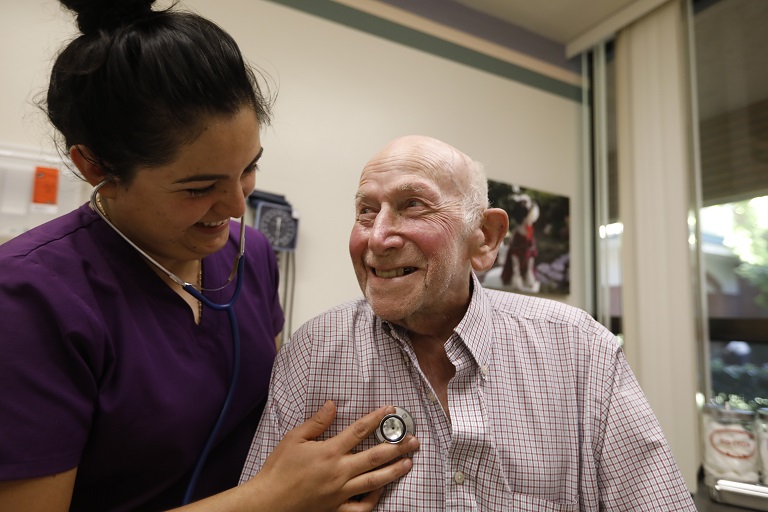Monoclonal Antibody Infusion: Interview with Dr. David Wong March 11, 2021
Dr. David Wong, Chief Medical Officer in the HHS Office of Minority Health, joined the LeadingAge Coronavirus Update Call on March 11, 2021. He responded to questions from Ruth Katz and from callers.
Q: You have led efforts to get monoclonal antibodies to minority and under-served populations. Please tell us about monoclonal antibodies and that project.
A: Monoclonal Antibodies were the first ray of hope in this pandemic. They became available in November. These drugs can be used in outpatient settings for people with mild to moderate symptoms who are in a high- risk group. Studies show that this can decrease the hospitalization rate by 70%. This is an exciting way to make a difference.
Q: If a person tests positive what is the next step? How do we get these monoclonal antibodies into people?
A: Initially, this process required fairly lengthy preparation of the IV and then a 60- minute infusion followed by 60 minutes of observation. So, it was about a three- hour process per person. However, things have changed since November. There are new products and approaches that can reduce the infusion time to 20 minutes and processes have been streamlined to allow greater efficiency in preparing the IV bags. As of earlier this week over 900,000 treatments have been distributed to 5,000 organizations and 35% of those doses have already been administered. That means over 15,000 lives saved or hospital admissions averted.
Q: We understand that access has been an issue. What did you do to get these treatments to more people?
A: Initially, monoclonal antibodies were distributed only through state health departments and they made the decision where drug would go. However, given the high COVID-19 case rates in November and December, those departments were overwhelmed and so they generally just sent the doses to big health systems. Nursing homes and other long term care settings had difficulty getting access to the treatments. Our team created a program called SPEED in early December. The first population we addressed was Long Term Care residents. We worked at getting doses to home infusion pharmacists in hopes that they would help to solve staffing issues in nursing homes. We also provided monoclonal antibodies to LTC pharmacies. We heard that was a good first step, but some long term care settings like assisted living needed staffing support to administer the treatments.
Q: What did you do then?
A: We wanted to empower communities to solve this problem themselves since we were trying to reach many different types of communities. We thought to tap into the Medical Reserve Corps. These are local groups of volunteers which were begun after 9/11. Volunteers wanted to help in that disaster, but when people arrived in NYC there was no systematic way to validate and utilize their skills. The Medical Reserve Corps was created to build such a framework. There are now 800 units with 200,000 volunteers across the country. We created the LISA Coalition (Long Term Care Infusion Support Activity.
Q: If members on the call are interested in getting monoclonal antibodies for someone who has tested positive, what should they do?
A: The long term care organization should reach out to the Medical Reserve Corps. They can find the nearest one on the website. They should explain that there is a program called LISA and we would like your help in addressing a person’s needs.
Q: How quickly do monoclonal antibodies need to be administered?
A: People need to be treated within ten days of symptom onset – but outcomes are better the sooner treatment is begun.
Q: We are seeing drops in the rate of COVID-19 due to vaccination. Is LISA still needed? Could this help settings that were not part of the Long Term Care Pharmacy Partnership?
A: We would have loved to be able to launch LISA earlier, but of course we know that there are still people getting COVID and we are also watching the issue of variants. There are new monoclonal antibody cocktails being developed. In some states AL and IL are lagging in vaccinations and also need staff support for infusion, so LISA still seems valuable.
Q: What about settings without medical staff?
A: They still need a physician to prescribe the monoclonal antibodies and there must be standing orders that the nurse volunteer has access to any needed medications (such as epinephrine in the event of a reaction). The home setting is different and a particular challenge in that reimbursement from CMS is one standard rate regardless of setting. That rate is generally insufficient for the costs of home infusion which require infusing one person in one location at a time. Large health systems may be the exception as the tradeoff of reduced hospitalizations may make that worth their while.
Q: Does insurance cover the costs of monoclonal antibody treatment?
A: Yes, CMS has an infusion rate and the drug itself has no cost as the government has purchased the supply at this point. For Medicaid and commercial payers please look at the infographic in the LISA concept note.
Q: If a provider has nursing support can they still work with the Medical Reserve Corps?
A; Yes, and the situation has evolved so that now there is a good supply of monoclonal antibodies and provides can now just order the monoclonal antibodies direct from the supplier.

Most Recommended
October 15, 2025
 Shutdown Week Three: Impact of Ongoing Closure on Affordable Housing
Shutdown Week Three: Impact of Ongoing Closure on Affordable Housing
December 10, 2025
Fiscal Year (FY) Funding 2026
October 07, 2025
Immigrant Workforce Matching Program Brings Workforce Relief
Recently Added
December 19, 2025
House Moves Forward on Affordable Housing Reforms
December 19, 2025
White House Cannabis EO Paves Way for Research, Access
December 19, 2025
LeadingAge Urges DHS to Maintain "Public Charge" Guardrails
December 18, 2025



